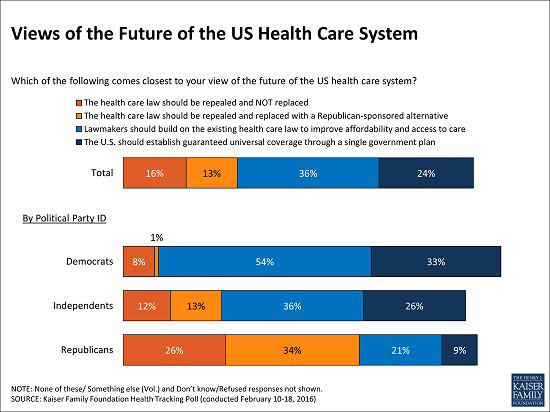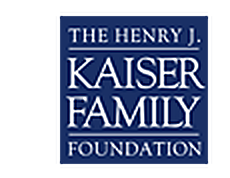Public Split On What to Do About the Health Care System, Though More Support Building on ACA Than Repealing It, Replacing with a GOP Alternative, or Creating a Single Payer Plan
Following Flint Water Crisis, Nearly Half Worry about Their Community's Water Supply
Almost Half of Public is Concerned about a Widespread Zika Outbreak in U.S. This Year
The latest Kaiser Health Tracking Poll finds the public as divided as the remaining presidential candidates over their vision for the future of the nation's health care system.
When asked to choose among four broad approaches for changing the health care system currently being discussed, the largest share (36%) say lawmakers should build on the Affordable Care Act to improve affordability and access to care, while fewer choose establishing guaranteed coverage through a single government plan (24%), repealing the ACA and not replacing it (16%), or repealing the law and replacing it with a Republican alternative (13%).
Among Democrats, a majority (54%) supports building on the existing law, as advocated by former Secretary of State Hillary Clinton, while about a third (33%) favor a single government plan, as advocated by Vermont Sen. Bernie Sanders. Among Republicans, a clear majority (60%) favor repealing the ACA, whether it's replaced (34%) or not (26%).

The survey also finds that the words to describe such a plan clearly affect how people view it. For instance, nearly two thirds (64%) of Americans say they have a positive reaction to the term "Medicare-for-all," and most (57%) say the same about "guaranteed universal health coverage.” Fewer have a positive reaction to "single payer health insurance system" (44%) or "socialized medicine" (38%). About half (53%) of Democrats say they have a very positive reaction to “Medicare-for-all” compared with 21 percent who say the same for “single payer health insurance system.”
When asked directly about "guaranteed health insurance coverage in which all Americans would get their insurance through a single government health plan," the poll finds half (50%) in favor and 43 percent opposed. Majorities of Democrats (70%) and independents (54%) support the concept, while few Republicans (20%) do.
The poll also finds the public's view of the ACA largely stable so far this year, with 46 percent holding an unfavorable view of the law and 41 percent holding a favorable view. The public is also almost evenly divided about whether the debate over the law should continue: 49 percent of the public says they are tired of hearing about the debate, while 46 percent say it is important for the debate to continue. Most Republicans (58%) want the debate to continue, while most Democrats (59%) say they are tired of it.
This month's Kaiser Health Policy News Index finds nearly two thirds of the public (64%) paying close attention to news about unsafe lead levels in the water supply in Flint, Mich., That is slightly more than say the same about the Zika virus outbreak (57%).
Nearly half (47%) are concerned about the safety of the water supply in their own community, including a quarter (27%) who are ‘very concerned.' More than three quarters (77%) report that they are concerned about the safety of the water supply in low income communities, including 40 percent who are “very concerned.”
Regarding the Zika virus, the survey finds 43 percent of the public is worried that the U.S. will see a large number of Zika cases this year. Somewhat fewer (28%) say they are worried they or someone in their family will be affected.
A majority of the public is aware of the potential ways to spread the virus and potential effects of the virus. Three quarters (76%) report that they are aware that a person can become infected through a bite from an infected mosquito and more than half (54%) are aware that a person can become infected by having sex with someone who is infected.

The poll was designed and analyzed by public opinion researchers at the Kaiser Family Foundation and was conducted from Feb. 10 to 18, 2016 among a nationally representative random digit dial telephone sample of 1,202. Interviews were conducted in English and Spanish by landline (421) and cell phone (781). The margin of sampling error is plus or minus 3 percentage points for the full sample. For results based on subgroups, the margin of sampling error may be higher.
Filling the need for trusted information on national health issues, the Kaiser Family Foundation is a nonprofit organization based in Menlo Park, California.
